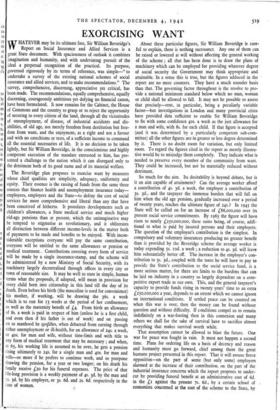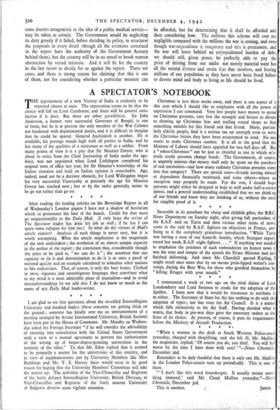EXORCISING WANT
WHATEVER may be its ultimate fate, Sir William Beveridge's Report on Social Insurance and Allied Services is a great State document. With spaciousness of outlook it combines imagination and humanity, and with undeviating pursuit of the ideal a perpetual recognition of the practical. Its purpose, governed rigorously by its terms of reference, was simple—" to undertake a survey of the existing national schemes of social insurance and allied services, and to make recommendations." The survey, comprehensive, discerning, appreciative yet critical, has been made. The recommendations, equally comprehensive, equally discerning, courageously ambitious yet defying no financial canon, have been formulated. It now remains for the Cabinet, the House of Commons and the country to grasp or to reject the opportunity of securing to every citizen of the land, through all the vicissitudes of unemployment, of disease, of industrial accidents and dis- abilities, of old age, not merely freedom from destitution but free- dom from want, and the enjoyment, as a right and not a favour and with no catechisms or tests, of a sufficient income to command all the essential necessaries of life. It is no decision to be taken lightly, but Sir William Beveridge, in the conscientious and highly competent execution of the mandate entrusted to him, has pre- sented a challenge to the nation which it can disregard only to the detriment both of its good name and of its material welfare.
The Beveridge plan proposes to exorcise want by measures whose chief qualities are simplicity, adequacy, uniformity and equity. Their essence is the raising of funds from the same three sources that finance health and unemployment insurance today— employees, employers and the State—to defray the cost of social services far more comprehensive and liberal than any that have been conceived of hitherto. It postulates developments such as children's allowances, a State medical service and much higher old-age pensions than at present, which the unimaginative may be tempted to stigmatise as revolutionary, and it obliterates all distinction between different income-levels in the matter both of payments to be made and benefits to be enjoyed. With incon- siderable exceptions everyone will pay the same contribution, everyone will be entitled to the same allowances or pension or medical treatment.. Contributions covering every form of service. will be made by a single insurance-stamp, and the scheme will be administered by a new Ministry of Social Security, with its machinery largely decentralised through offices in every city or town of reasonable size. It may be well to state in simple, human terms what the proposals, if adopted, will mean in provision for every child born into citizenship in this land till the day of its death. Even before his birth (the masculine is used for convenience) his mother, if working, will be drawing the 36s. a week which is to run for 13 weeks at the period of her confinement, as well as the maternity benefit of £4. From birth an allowance of 8s. a week is paid in respect of him (unless he is a first child, and even then if his father is out of work) and on passing on to manhood he qualifies, when debarred from earning through either unemployment or ill-health, for an allowance of 24s. a week, or 4os. for man and wife, without time-limit and with title to any form of medical treatment that may be necessary ; and when, at 65, his working life is assumed to be over, he gets a pension rising ultimately to 24s. for a single man and 4os. for man and wife—or-more if he prefers to continue work, and so postpone drawing the pension, for a year or two longer; on his death his family receive £20 for his funeral expenses. The price of that life-long provision is a weekly payment of 4s. 3d. by the man and :!.S. 3d. by his employer, or 3s. 6d. and 2s. 6d. respectively in the case of women. About these particular figures, Sir William Beveridge is care- ful to explain, there is nothing sacrosanct. Any one of them can be raised or lowered at will without affecting the general working of the scheme ; all that has been done is to draw the plans of machinery which can be employed for providing whatever degree of social security the Government may think appropriate and attainable. In a sense this is true, but the. figures adduced in the report are no mere counters. They have a much sounder basis than that. The governing factor throughout is the resolve to pro- vide a national minimum standard below which no man, woman or child shall be allowed to fall. It. may not be possible to assess that precisely—rent, in particular, being a peculiarly variable factor—but investigations in London and many provincial cities have provided data sufficient to enable Sir William Beveridge to fix with some confidence 4os. a week as the just allowance for a man and wife, with 8s. for each child. If that figure is accepted (and it was determined by a particularly competent sub-com- mittee) all the other figures are in greater or less degree determined by it. There is no doubt room for variation, but only limited room. To regard the figures cited in the report as merely illustra- tive would be to misjudge them completely. They indicate what is needed to preserve every member of the community from want. They could be increased, but not be materially reduced without detriment.
So much for the aim. Its desirability is beyond debate, but is it an aim capable of attainment? Can the average worker afford . a contribution of 4s. 3d. a week, the employer a contribution of 3s. 3d., and the taxpayer the immense burden that will fall on him when the old age pension, gradually increased over a period of twenty years, reaches the ultimate figure of 24s.? In 1945 the State will be called on for an increase of £86,000,000 over its present social service commitments. By 1965 the figure will have risen to nearly £250,000,000, these sums being, of course, addi- tional to what is paid by insured persons and their employers. The question of the employee's contribution is the simplest. In compulsory and voluntary insurances producing no greater benefit than is provided by the Beveridge scheme the average worker is today expending 5s. rod. a week ; a reduction to 4s. 3d. will leave him substantially better off. The increase in the employer's con- tribution to 3s. 3d., coupled with the taxes he will have to pay to provid. the State's contribution to the social service fund, is a more serious matter, for there are limits to the burdens that can be laid on industry in a country so largely dependent on a com- petitive export trade as our own. This, and the general taxpayer's capacity to provide funds rising in twenty years' time to an extra £250,000,000 a year, depends to an extent which we cannot ignore on international conditions. If settled peace can be counted on when this war is over, then the money can be found without question and without difficulty. If conditions compel us to remain indefinitely on a war-footing then in this connexion and many others we shall for the sake of survival have to sacrifice almost everything that makes survival worth while.
That assumption cannot be allowed to blast the future. One war for peace was fought in vain. It must not happen a second time. Plans for ordering life on a basis of decency and reason and humanity must go forward, chief among them the great humane project presented in this report. That it will arouse fierce opposition—on the part of some (but only some) employers alarmed at the increase of their contribution, on the part of the industrial insurance concerns which the report proposes to under- cut by providing funeral benefit at an administrative cost of 6d. in the £i against the present 7s. 6d., by a certain school of economists concerned at the cost of the scheme to the State, by some doctors antagonistic to the idea of a public medical service— may be taken as certain. The Government would be neglecting its duty grossly if it failed, before deciding its policy, to scrutinise the proposals in every detail (though all the estimates contained in the report have the authority of the Government Actuary behind them), but the country will be in no mood to brook wanton obstruction by vested interests. And it will be for the country in the last resort to decide for or against the report. There are cases, and there is strong reason for claiming that this is one of them, not for considering whether a particular measure can be afforded, but for determining that it shall be afforded and then considering how. The millions this scheme will cost are negligible compared with the millions the war is costing, and even though war-expenditure is temporary and this is permanent, and the war will leave behind an unprecedented burden of debt, we should still, given peace, be perfectly able to pay the price of driving from our midst not merely material want but all the mental distress and strain that that involves, and freeing millions of our population as they have never been freed before to devote mind and body to living as life should be lived.



























 Previous page
Previous page